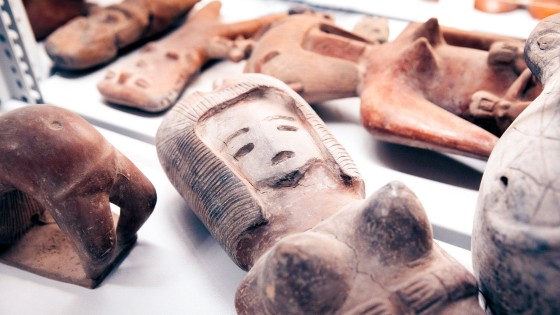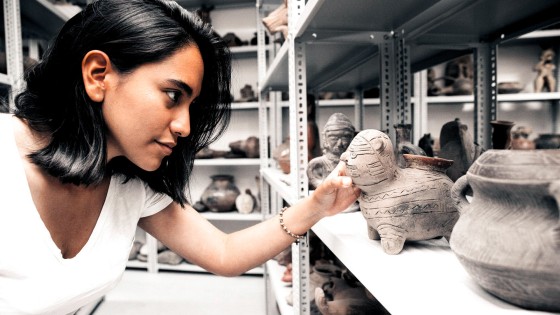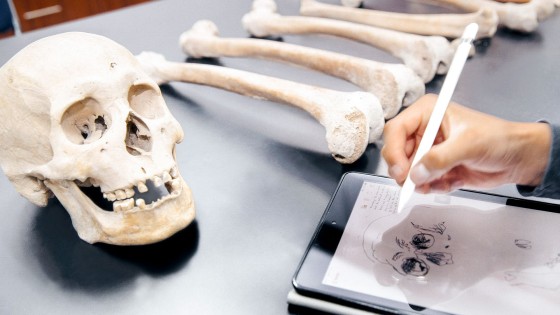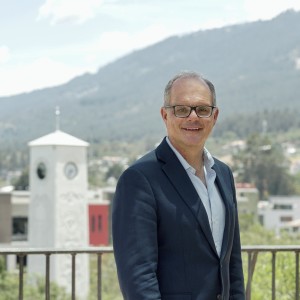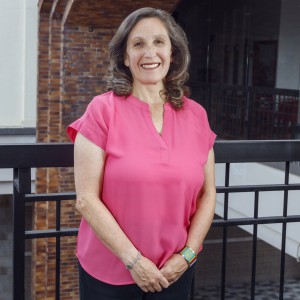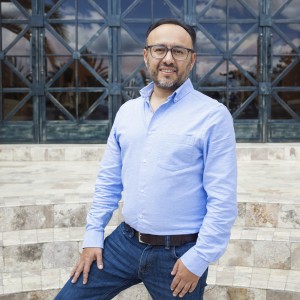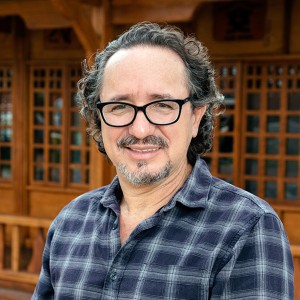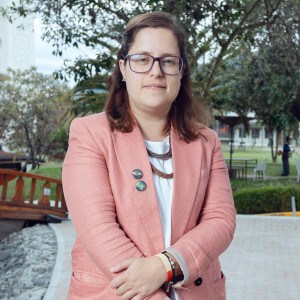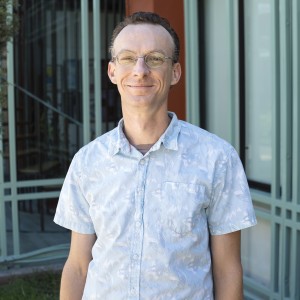Anthropology
"We study human diversity in the past and present."
Anthropology
The Anthropology program explores the origin, changes over time, and contemporary dynamics of human diversity. It answers perhaps the most important question that humanity has asked itself since the beginning of time: What does it mean to be human? In an attempt to answer this question, Anthropology thrives on various disciplines and knowledge and is shaped as an integral discipline that seeks to understand the human from a cultural, social, linguistic, and biological perspective, from its origin to the present.
Following the academic perspective developed in North America, the USFQ Anthropology program has been designed based on the focus of the four fields of Anthropology: Cultural Anthropology, Linguistics, Physics, and Archeology. Currently, the emphasis is on Cultural Anthropology and Archeology, and thus, the program focuses on the study of human diversity in the past and the present. The various topics that are studied and investigated within the major include: Political Anthropology, Anthropology of Religion, Gender and Sexual Diversities, Migration and Transnationalism, Linguistic Anthropology, Human Evolution, Forensic Anthropology, Archeology, and Heritage and Community, among others.
Advantages
- It is the only Anthropology program in the country that includes a comprehensive vision of Anthropology based on the four fields: Cultural, Physics, Linguistics, Archeology.
- Emphasizes theoretical education with field training. • It allows collaborative work with professors on diverse projects and the developing of skills from the beginning of the learning process.
- The faculty covers field work on the Coast, Highlands, Amazon, and the Galapagos Islands.
- It has very dynamic professors who are always leading in research and publications.
- They maintain pioneering approaches in the country such as the following programs: Community Archeology, Ethno-Racial and Sex-Gender Studies, Tourism and Heritage, Mobilities and Transnationalism, Development and Ethnopolitics, Historical Ecology.
- It is the only program that maintains a Research Center where students engage in internships with professors.
- It is the only Anthropology program that conducts research in the Galapagos Islands in conjunction with GAIAS and GSC.
- It maintains a close relationship with the most important Ethnic Diversity program of an Ecuadorian university that involves students from Kichwa and Shuar peoples and nationalities, among others.
- It maintains the best equipped Archeology laboratory associated with an Anthropology program in Ecuador.
Professional Field
Knowledge:
- The Liberal Arts grad has a multidisciplinary knowledge in different areas of the Social Sciences and Humanities, and is familiar with different methods and theories used in these areas.
Skills:
- The Liberal Arts grad has the ability to carry out research work in the fields of Social Sciences and Humanities.
- Throughout their major, the student develops analytical and argumentation skills, and the ability to communicate in other languages, orally and in writing.
- Also, Liberal Arts grads develop critical thinking and the ability to analyze changing situations.
Mindset:
- The Liberal Arts graduate assumes a critical and committed attitude towards the world around him.
Occupational field:
- The Liberal Arts student is prepared to successfully enter graduate programs, as well as undertake professional challenges in areas such as education, research, and culture.
Professional Profile
The student graduating with a Liberal Arts major is prepared to successfully enter graduate programs, as well as to undertake professional challenges in the following areas:
- Education: Upon graduation, individuals can continue to specialize to teach in a wide range of disciplines.
- Editing: Because some of the most widely practiced skills in this major are critical reading and rhetorical writing, Liberal Arts graduates can perform in various roles in the editorial area such as proofreaders, text evaluators, line coordinators editorials, among others.
- Cultural management: Extensive knowledge in the humanities and social sciences enables Liberal Arts graduates to serve as cultural advisers, event managers, public relations managers, or content creators for museums, galleries, and non-governmental organizations.
- Academia: The skills and knowledge acquired during this major prepare graduates to do research of a high theoretical level.
Testimonials
"During my time at USFQ, I had the opportunity to take various Anthropology and Archeology courses. Upon graduation, I found out about the Erasmus Mundus Master in Archaeological Material Sciences: I was accepted and obtained a full scholarship to study in Portugal, Greece, and Italy. I believe that personalized education and direct contact with professors allowed me not only to be accepted into this program, but also to be on a par with students from various prestigious universities around the world.”
- María Isabel Guevara Duque -
“Studying Anthropology at USFQ not only broadened my academic opportunities, but also shaped me as a human being. I have completed my graduate degree in Digital Culture at King's College London. The foundations of critical thinking and contemporary ethnography with an interdisciplinary focus forged the foundations for my excellent academic performance within this study program. Studying Anthropology at USFQ was essential to expanding my area of work.”
- Patricia Celi -
"The interdisciplinary and intersectional character of Anthropology at USFQ has allowed me to link issues of territoriality, class, and gender, among other variables for understanding the rural reality of the city of Quito. I am currently working as a political and territorial coordination advisor to Councilor Luis Reina.”
- Vladimir Obando -
"From my years in the Anthropology program at USFQ, I could say that what stands out most is the practical opportunities, from field trips in each course, to direct participation in the professors' research. The feeling of collaboration between professors and students has been evident, and being able to develop that closeness has greatly strengthened my learning. Additionally, the program's teaching team is very complete, that is, it covers all branches of anthropology: biological, linguistic, and cultural archeology, giving the opportunity for each student to delve into the branch that interests them the most with specialized professors. Definitely, studying Anthropology at USFQ has given me very valuable practical training, in field work and in ethnography."
- Julia Correa Ponce -
"Studying Anthropology at USFQ has given me the opportunity to group numerous branches of knowledge and contrast diverse perspectives around the human being and culture in a holistic way, nurturing a critical and purposeful vision regarding society. In turn, the predisposition of the faculty to involve students in research projects, their active participation in field work and community outreach projects are alternatives that encourage students to bring their theoretical knowledge to practice in a committed and responsible way."
- Alejandro Peña Bucheli -
"Being a culturally mega-diverse country, Ecuador is a perfect setting to study human diversity. At USFQ we have created a space to study this mega-diversity in both its historical and contemporary content. In our very young program, we prepare future professionals in Anthropology with a creative, entrepreneurial spirit, with strong ethical principles: students who will lead academic research and applied work. In our program, the study of contemporary diversity (Cultural Anthropology) and diversity in the past (Archeology) is emphasized. The USFQ Anthropology degree offers a quality education.”
- Florencio Delgado Espinoza Professor and Coordinator of Anthropology -
"Cultural Anthropology is a powerful tool for understanding a wide variety of contemporary social dynamics and phenomena. Far from the image of Anthropology dedicated only to the study of specific and isolated cultures, the work being done today allows us to look at the relationships that are woven in an increasingly globalized world. New discussions around issues of gender, development, use of resources, technology, tourism and others are generated in a variety of communities that traditionally were not taken into account by Anthropology. Thus, the spectrum of study opens up more and more, incorporating other interesting spaces such as cities, neighborhoods, corporate environments, and even social networks."
- Consuelo Fernández-Salvador - Professor of Cultural Anthropology -
Academic Faculty

